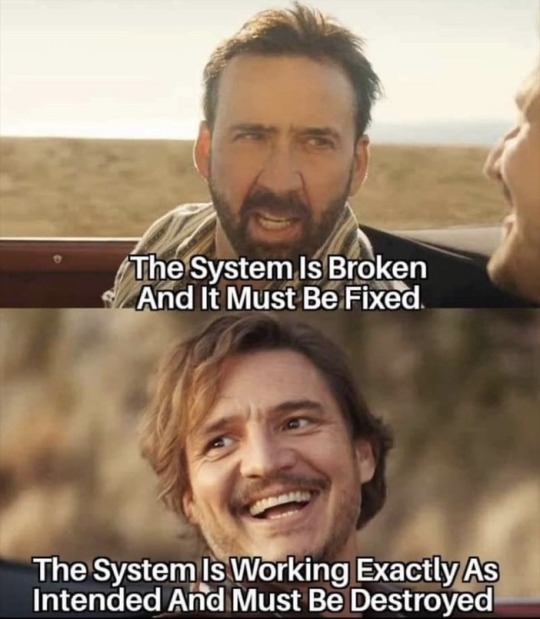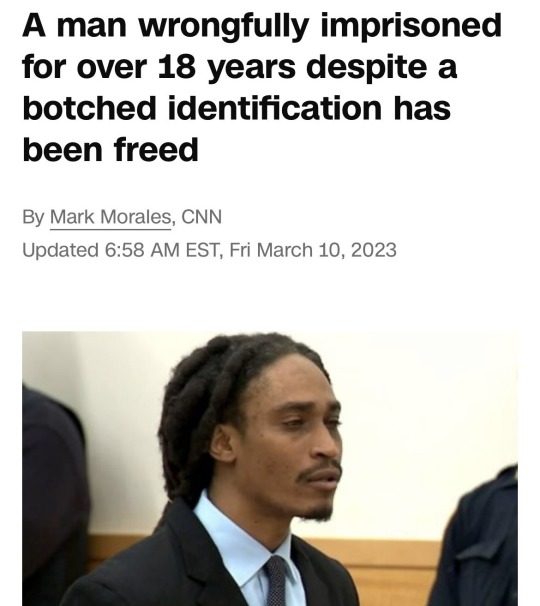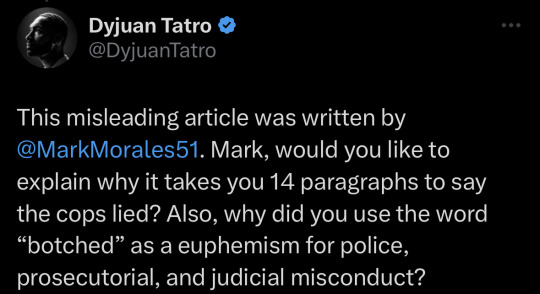#political systems
Text
I'm begging y'all to understand this:
The U.S. mostly has a first-past-the-post voting system. The candidate with the most votes wins and there are no prizes for second place. If a district goes 49% Democratic and 51% Republican, the Republicans win the district
This makes a two party system almost inevitable because in a system with more than two parties, the instant one party gets the support of over a third of the population, the other parties cannot compete unless they join forces
And a two party system means, crucially, that if you want to get more voters, there are only two ways to get them:
Get more people to vote that ordinarily wouldn't vote at all.
Take voters from the other party.
That's it.
The reason Democrats are "not radical enough" is that, if they can't turn non-voters into voters, to get more people to vote Democratic, they have to appeal to Republicans enough to convince them to change sides. There's nowhere else to get people from.
The reason the country seems to "skew" Republican over time is not because of Democrats caving to goalpost moving, it's because of gerrymandering and our system prioritizing land area over people's votes
If 51% of voters in my district vote Republican, it's a republican district. If 51% of districts are Republican districts, the state is a "red state." That state can end up with all republican representatives even if there are barely more Republicans than Democrats
Being more spread out makes it easier for Republicans to dominate districts, too. It's like the land is voting instead of the people.
4K notes
·
View notes
Text
Fantasy Worldbuilding Questions (Policy and Diplomacy)
Policy and Diplomacy Worldbuilding Questions:
What kinds of political systems exist in this world?
What unique laws or political customs shape public and private life in this world?
Who are the primary figures who influence (or manipulate) public opinion?
Who are behind-the-scenes figures in politics who have influence the average Joe might not know about?
Where are the centers of power or law (and why are they located here)?
Where do key political negotiations, summits, meetings take place?
When did the current political dispensation take power?
When will leadership change (if ever) in this world, and why?
Why do alliances form or sever in this world?
Why do people in this world support (or rebel against) its political structures?
❯ ❯ ❯ Read other writing masterposts in this series: Worldbuilding Questions for Deeper Settings
#worldbuilding#writeblr#writing tips#writing advice#fiction writing#novel writing#writing#diplomacy#political systems#unique laws#fictional diplomacy#key political negotiations#fwq
170 notes
·
View notes
Note
What political systems could and could not work for solarpunk?
I’ll be fully 110% honest. I don’t know. Sure would like to know! Can’t say I do.
In fact when I saw this ask my first thought was ‘what the fuck is a political system.’
Instinctually, I would say a democracy? But like a True Democracy, and not the Democratic Republic thing we’ve got going on.
In an ideal hypothetical world, electing representatives should mean they represent what your sector wants. But as we’ve seen with irl examples, things like gerrymandering, poll taxes, and disenfranchising get in the way of that, not to even mention people who claim they’ll represent people’s wishes and then. Don’t do that.
Long story short I’m not sure. By all means if someone else has ideas, feel free to respond to this with your input!
#ani rambles#out of queue#solarpunk#political systems#honestly I’d love to hear what others think on this#im more of the green and gardening side of solarpunk idk shit about politics#plus it would help with the story I’m writing#answered asks#anonymous
37 notes
·
View notes
Text
Those who harbour illusions about the possibility of a purely political struggle and the power of this or that formula or system, with no new human quality as its exact counterpart, have learned no lessons from the past.
Julius Evola.
#julius evola#a message to the youth#europe#adventure#tradition#aristocracy#heroism#men among the ruins#ride the tiger#european tradition#rene guenon#right#traditional values#political systems#democracy#monarchy
7 notes
·
View notes
Text

[There are good and bad things in all political systems.]
#s36e15 takeout - all kinds of flavor#guy fieri#guyfieri#diners drive-ins and dives#bad things#political systems#good
4 notes
·
View notes
Text
Question for my Canadian followers
To my Canadian friends, how 'efficient' is the "Capitalist/Socialist/Democratic" system in Canada working? Because an YouTuber viewer of mine said it is an efficient system. But this is also someone who says that, "Poor relative." As in, "They will always be poor people. As in they will always folks that have less than others."
1 note
·
View note
Text
I believe that one of the biggest problems with current political systems is the strong centralization of power, if there was a way to eliminate such form of government, many problems would be avoided, because when you put a lot of power in the hands of just a few, it creates a greater chance of happening serious mistakes, because if a mind with high power makes a bad decision, many who are at the mercy of that power are harmed. So I think it would be ideal to avoid centralization of power as much as possible, the more fragmented society is in terms of distribution of power, the better it would be, because in case a mistake is committed it would cause less damage, since there would not be so many at the mercy of the same leader.
#Thought#Thoughts#Politics#Power#Society#Centralization#Government#Political System#Political Systems#State
0 notes
Text

#dank memes#funny post#meme#dank#funny#funny pics#silly#funny pictures#dankest memes#humor#the system#politics
5K notes
·
View notes
Text

25K notes
·
View notes
Text
Unlike the old political system, the new democracy is not reserved for well-off white men.
"Humankind: A Hopeful History" - Rutger Bregman
#book quote#humankind#rutger bregman#nonfiction#politics#political systems#democracy#porto alegre#brazil#brasil
1 note
·
View note
Text

Source



#criminal justice#current events#mass news media#racism#judicial system#criminal justice system#politics#us politics#government#the left#news
14K notes
·
View notes
Text
reblog if you think these are all valid reasons for a student or an employee to take a day off from their school or their job without their grades or paycheck being affected in any way:
- period cramps
- exhaustion, be it mental or physical
- depression, anxiety, and other mental health related issues
#mental health#mental health awareness#mental health support#mental health issues#student#students#education#education system#politics#positivity#self love#self care#important psa#psa#academia#healthcare#hygiene#health and wellness#school#student life
2K notes
·
View notes
Text
"Tuesday’s [April 9, 2024] definition-shifting court ruling means nearly 50 governments must now contend with a new era of climate litigation.
Governments be warned: You must protect your citizens from climate change — it’s their human right.
The prescient message was laced throughout a dense ruling Tuesday from Europe’s top human rights court. The court’s conclusion? Humans have a right to safety from climate catastrophes that is rooted in their right to life, privacy and family.
The definition-shifting decision from the European Court of Human Rights means nearly 50 governments representing almost 700 million people will now have to contend with a new era of litigation from climate-stricken communities alleging inaction.
While the judgment itself doesn’t include any penalties — the case featured several women accusing Switzerland of failing to shield them from climate dangers — it does establish a potent precedent that people can use to sue governments in national courts.
The verdict will serve “as a blueprint for how to successfully sue your own government over climate failures,” said Ruth Delbaere, a legal specialist at Avaaz, a U.S.-based nonprofit that promotes climate activism...
Courting the courts on climate
The European Court of Human Rights was established in the decade following World War II but has grown in importance over the last generation. As the judicial arm of the Council of Europe, an international human rights organization, the court’s rulings are binding on the council’s 46 members, spanning all of Europe and numerous countries on its borders.
As a result, Tuesday’s [April 9, 2024] ruling will help elevate climate litigation from a country-by-country battle to one that stretches across continents.
Previously, climate activists had mostly found success in suing individual countries to force climate action.
A 2019 Dutch Supreme Court verdict forced the Netherlands to slash its greenhouse gas emissions by 25 percent, while in 2021 a French court ruled the government was responsible for environmental damage after it failed to meet greenhouse gas reduction goals. That same year, Germany’s Constitutional Court issued a sweeping judgment that the country’s 2019 climate law was partly “unconstitutional” because it put too much of the emissions-cutting burden on future generations.
Even in the U.S., young environmental activists won a local case last year against state agencies after arguing that the continued use of fossil fuels violated their right to a "clean and healthful environment."
But 2024 is shaping up to be a turning point for climate litigation, redefining who has a right to sue over climate issues, what arguments they can use, and whom they can target.
To start, experts overwhelmingly expect that Tuesday’s ruling will reverberate across future lawsuits — both in Europe and globally. The judgment even includes specifics about what steps governments must take to comply with their new climate-related human rights obligations. The list includes things like a concrete deadline to reach climate neutrality, a pathway to getting there, and evidence the country is actually on that path...
Concretely, the verdict could also affect the outcomes of six other high-profile climate lawsuits pending before the human rights court, including a Greenpeace-backed suit questioning whether Norway's decision to grant new oil and gas licenses complies with its carbon-cutting strategy.
An emerging legal strategy
In the coming months, other international bodies are also expected to issue their own rulings on the same thorny legal issues, which could further solidify the evolving trend.
The International Court of Justice, the International Tribunal for the Law of the Sea and the Inter-American Court of Human Rights all have similar cases working through the system.
"All these cases together will clarify the legal obligations of states to protect rights in the context of climate change — and will set the stage for decades to come," said Chowdhury, from the environmental law center."
-via Politico, April 9, 2024
#europe#human rights#legal system#international politics#climate change#climate emergency#climate hope#international law#netherlands#france#germany#united states#switzerland#good news#hope
1K notes
·
View notes
Text
The total archive: Data, subjectivity, universality (Jardine & Drage, 2018)
Authors: Boris Jardine and Matthew Drage
Date: 2018
Abstract:
The complete system of knowledge is a standard trope of science fiction, a techno-utopian dream and an aesthetic ideal. It is Solomon’s House, the Encyclopaedia and the Museum. It is also an ideology – of Enlightenment, High Modernism and absolute governance. Far from ending the dream of a total archive, 20th-century positivist rationality brought it ever closer. From Paul Otlet’s ‘Mundaneum’ to Mass-Observation, from the Unity of Science movement to Wikipedia, the dream of universal knowledge dies hard. As a political tool, the total archive encompasses population statistics, gross domestic product, indices of the Standard of Living and the international ideology of the United Nations Educational, Scientific and Cultural Organization, the World Health Organization, the free market and, most recently, Big Data. Questions of the total archive engage key issues in the philosophy of classification, the poetics of the universal, the ideology of surveillance and the technologies of information retrieval. What are the social structures and political dynamics required to sustain total archives, and what are the temporalities implied by such projects? This introduction and the articles that follow describe and place in historical context a series of concrete instances of totality. Our analysis is arranged according to four central themes: the relationship between the Archive (singular) and archives (plural); the image of the archive and the aesthetics of totality; pathologies of accumulation; and the specific historical trajectory of the total archive in the 19th and 20th centuries.
Find the full article here!
#aesthetic#archives#recordkeeping#cultural values#cultural identity#classification#information retrieval#information sources#information technology#knowledge#politics#political systems#social networks#social systems#subjectivity#surveillance
0 notes
Text
I feel like both internet liberals and leftists have a tendency to reverse-Great Man Theory Ronald Reagan at the expense of any insight into the history of his policies or the conservative movement that led up to him.
#YOU CAN’T JUST BLAME EVERYTHING ON HIM WITHOUT TACITLY ABSOLVING COUNTLESS OTHER MONSTERS AND THE WHOLE FUCKING SYSTEM OF ITS GUILT.#IT’S DEEPLY INDIVIDUALISTIC AND ARGUABLY ANTIHISTORICAL.#Anyway this is because I saw a post that blamed him for the US backing brutal regimes in the global south under the guise of anticommunism.#When that famously started back in the post-WWII era and has its roots in Monroe Doctrine ideology.#FYI I fucking hate him but he’s a part of a larger picture.#(Anyway I study American politics during the Cold War with a focus on the rise of the far right.)#original content#100#500#1k
1K notes
·
View notes
Text
JUDGING THE NATURAL RIGHTS VIEW, X
An advocate of parochial federalism continues his/her presentation[1] …
This blogger has commented extensively on the tumbled history of political science since the mid-point of the last century. From historical based to behavioral to post behavioral to now critical theory-based research, that discipline has experienced an array of viewpoints by which its research has been guided. As for its effect on civics education, the behavioral/popular values approach with a political systems/structural-functional model guidance has dictated its content in most classrooms.
Whether in the behavioral or post-behavioral stage, the field is/was concerned with how political systems meet the needs of their individual members. This view has maintained its popularity among secondary school educators. They, the educators, see systems as overall sets of institutions that are formulated to be neutral to vying interests.[2] One still observes, even in the post behavioral age, that approach in general government curricular literature and in classroom materials (for example, see the bestselling textbook, Magruder’s American Government[3]).
That is, systems are depicted, to varying degrees, as meeting consumer needs or political demands of their respective citizenries. And this general approach to the study of politics should be kept in mind as students of politics consider or critique this approach. As the analysis in upcoming postings answers the questions posed by Eugene Meehan[4] to analyze the viability of this construct, this consumer/citizen orientation should be kept in mind.
Under the liberal/natural rights perspective, importance lies in the ability of schools to prepare students to make sure that their individual rights are understood and that they can pursue their individual interests with reliable knowledge and effective skills. Their government instruction at the secondary level should be to provide that knowledge and skills.
If successful, students, as adults, can enter the political fray with reasonable chances of success. This leads to what Robert Putnam advocates: social capital.[5] The natural rights perspective, therefore, is a highly practical approach. In this vein, its focus should be where political powers lie.
On that front, readers should keep in mind that the US has a federal system of government in which the power of the overall state is divided between the central and state governments. But the balance between the two levels has through the history of the republic shifted in the direction of the central government. This shift has been caused by a variety of reasons:
· the nationalization and now globalization of the economy,
· the inability of state governments to meet the challenges of economic disasters such as the Great Depression,
· the demands posed by foreign powers in the age of industrialized and nuclear warfare,
· the increased sensitivities to egalitarian ideals and the consequent demands for uniform treatment by public and private entities,
· the incorporation by the federal courts, beginning with the Warren Court, of the Bill of Rights’ guarantees against the states through the Fourteenth Amendment,
· the multiplicity of problems in the modern economy which are truly national in scope,
· the inability or unwillingness of states to tackle social problems such as segregation of the races or poverty, and
· the cultural expression that has grown within the population to look toward Washington for solutions to social and natural problems.[6]
A secondary course in American government or civics should reflect these realities.
Therefore, such courses should divide their attention so that the major concern be with the federal government and its operations. Any issues that they analyze, and study should for the most part be national and international ones. While state and local governments should not be totally ignored, they should not be given nearly the attention of that of the central government.
Political frays of the day are ones in which there are many competing cultural views and in which many important decisions are made by national institutions far from the control of either common individuals or local communities. In this environment, as Maurice P. Hunt and Lawrence E. Metcalf wrote in 1968,
… we say that the chief role of education in a democracy is intelligent or critical transmission of cultural heritage, during the course of which disagreements among individuals and incompatibilities in personal outlook are exposed and resolved creatively.[7]
People have rights concerning their heritage in a diverse population such as that of the US. The government that oversees this competing and conflict-ridden environment needs to, in the name of fairness and respect for individual and group rights involved, manage those contentions that such an environment is bound to generate.
That is, it needs to manage the contentious arenas in an unbiased and procedurally neutral manner.[8] How well is America doing? Here are partial findings from a Pew Research Center study,
Despite these criticisms [referring to mixed feelings of support on the current quality of democratic rule], most Americans say democracy is working well in the United States – though relatively few say it is working very well. At the same time, there is broad support for making sweeping changes to the political system: 61% say “significant changes” are needed in the fundamental “design and structure” of American government to make it work for current times.
The public sends mixed signals about how the American political system should be changed, and no proposals attract bipartisan support. Yet in views of how many of the specific aspects of the political system are working, both Republicans and Democrats express dissatisfaction.
To be sure, there are some positives. A sizable majority of Americans (74%) say the military leadership in the U.S. does not publicly support one party over another, and nearly as many (73%) say the phrase “people are free to peacefully protest” describes this country very or somewhat well.
In general, however, there is a striking mismatch between the public’s goals for American democracy and its views of whether they are being fulfilled. On 23 specific measures assessing democracy, the political system and elections in the United States – each widely regarded by the public as very important – there are only eight on which majorities say the country is doing even somewhat well.[9]
Through the years, America has been considered one of the least – if not the least – statist or authoritarian nation. Yet Matthew C. MacWilliams reports,
What I found is that approximately 18 percent of Americans are highly disposed to authoritarianism, according to their answers to four simple survey questions used by social scientists to estimate this disposition. A further 23 percent or so are just one step below them on the authoritarian scale. This roughly 40 percent of Americans tend to favor authority, obedience and uniformity over freedom, independence and diversity.[10]
With that cautionary note, one that an advocate of natural rights would deem as highly worrisome and serving to advance a commitment to support the natural rights approach in civics, this posting marks an end to this review of that approach. Next will be the application of the approach – given Meehan’s concerns – as it affects the commonplaces of curricular development.
[1] This presentation continues with this posting. The reader is informed that the claims made in this posting do not necessarily reflect the beliefs or knowledge of this blogger. Instead, the posting is a representation of what an advocate of the natural rights view might present. This is done to present a dialectic position of that construct. This series of postings begins with “Judging Natural Rights View, I,” August 2, 2022.
[2] Michael J. Sandel, Democracy's Discontent: America in Search of a Public Philosophy (Cambridge, MA: The Belknap Press of Harvard University Press, 1996).
[3] Daniel M. Shea, Magruder’s American Government (Boston, MA: Prentice Hall/Pearson, 2019).
[4] Eugene J. Meehan, Contemporary Political Thought: A Critical Study (Homewood, IL: Dorsey Press, 1967).
[5] Social capital, using the thoughts of Robert Putnam, is characterized by having an active, public-spirited citizenry, egalitarian political relations, and a social environment of trust and cooperation. See Robert D. Putnam, Bowling Alone: The Collapse and Revival of American Community (New York, NY: Simon & Schuster, 2000). This state exists to the extent a citizenry chooses to adopt the entailed values.
[6] As these words are written, the City of Jackson, Mississippi, is seeking federal assistance to solve its water problems. Currently, the water cannot be drunk safely.
[7] Maurice P. Hunt and Lawrence E. Metcalf, Teaching High School Social Studies: Problems in Reflective Thinking and Social Understanding (New York, NY: Harper and Row Publication, 1968), 35.
[8] Sandel, Democracy's Discontent.
[9] “The Public, The Political System and American Democracy,” Pew Research Center (April 26, 2018), accessed August 31, 2022, https://www.pewresearch.org/politics/2018/04/26/the-public-the-political-system-and-american-democracy/. To give readers a sense of the referred to measures, they include “Rights and freedoms of all people are respected” and “Elected officials face serious consequences for misconduct.”
[10] Matthey C. MacWilliams, “Trump Is an Authoritarian. So Are Millions of Americans,” Politico (September 23, 2020), accessed August 31, 2022, https://www.politico.com/news/magazine/2020/09/23/trump-america-authoritarianism-420681.
#political science#political systems#civics curriculum#consumer/citizen orientation#central government#political conflict#citizen satisfaction#authoritarian dispositions#civics education#social studies
0 notes